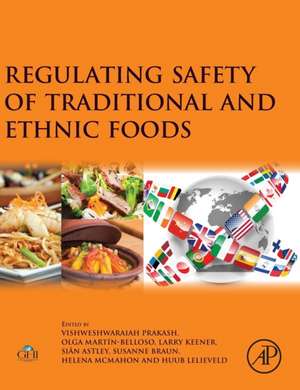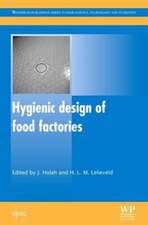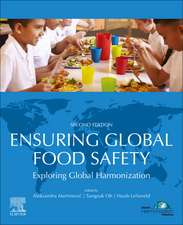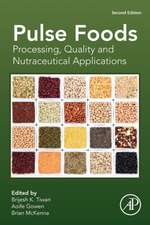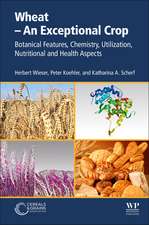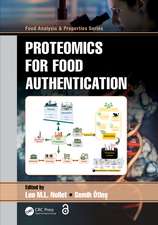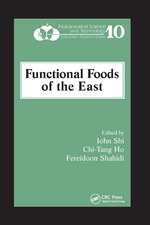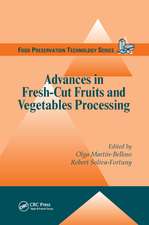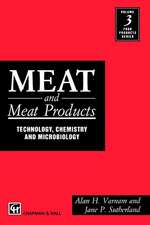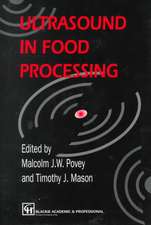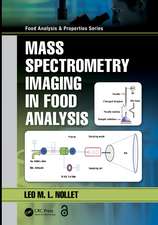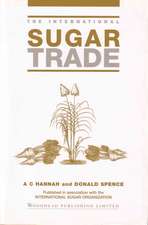Regulating Safety of Traditional and Ethnic Foods
Editat de V. Prakash, Olga Martin-Belloso, Larry Keener, Siân B. Astley, Susanne Braun, Helena McMahon, Huub L. M. Lelievelden Limba Engleză Hardback – 24 noi 2015
Many traditional foods provide excellent nutrition from sustainable resources, with some containing nutraceutical properties that make them not only a source of cultural and traditional value, but also valuable options for addressing the growing need for food resources. This book discusses these ideas and concepts in a comprehensive and scientific manner.
- Addresses the need for balance in safety regulation and retaining traditional food options
- Includes case studies from around the world to provide practical insight and guidance
- Presents suggestions for developing appropriate global safety standards
Preț: 585.72 lei
Preț vechi: 674.51 lei
-13% Nou
Puncte Express: 879
Preț estimativ în valută:
112.09€ • 116.59$ • 92.54£
112.09€ • 116.59$ • 92.54£
Carte tipărită la comandă
Livrare economică 07-21 aprilie
Preluare comenzi: 021 569.72.76
Specificații
ISBN-13: 9780128006054
ISBN-10: 0128006056
Pagini: 536
Dimensiuni: 191 x 235 x 30 mm
Greutate: 1.13 kg
Editura: ELSEVIER SCIENCE
ISBN-10: 0128006056
Pagini: 536
Dimensiuni: 191 x 235 x 30 mm
Greutate: 1.13 kg
Editura: ELSEVIER SCIENCE
Public țintă
University professors and students, Food companies (producers and traders), NGO's, Researchers interested in food biochemistry, Regulators, in particular those that export or import EF and TFCuprins
Chapter 1: Introduction: The Importance of Traditional and Ethnic Food in the Context of Food Safety, Harmonization, and Regulations
Chapter 2: Safety by Control of Water Activity: Drying, Smoking, and Salt or Sugar Addition
Chapter 3: Typical Traditional Processes: Cooking and Frying
Chapter 4: Safety of Meat and Poultry
Chapter 5: Safety of Fish Products
Chapter 6: Safety in the Shrimp Supply Chain
Chapter 7: Safety of Fermented Meat
Chapter 8: Safety of Fermented Fish Products
Chapter 9: Safety of Milk Processing and Distribution Chain in India
Chapter 10: Safety of Fermented Dairy Products
Chapter 11: Safety of Foods Based on Insects
Chapter 12: Safety of Honey
Chapter 13: Naturally Occurring Toxicants: Presence in Selected Commonly Consumed Fruits
Chapter 14: Safety of Fermented Cereals and Legumes
Chapter 15: Safety of Fermented Products Based on Soybean
Chapter 16: Safety of Fermented Cassava Products
Chapter 17: Safety of Traditional Bread Production
Chapter 18: Safety of Fermented Fruits and Vegetables
Chapter 19: Safety of Kimchi
Chapter 20: Safety of Borsh
Chapter 21: Safety of Edible Flowers
Chapter 22: Safety of Foods Based on Mushrooms
Chapter 23: Food Safety Regulations Applied to Traditional and Ethnic Foods
Chapter 24: Validated Methods for the Analysis of Traditional and Ethnic Foods and Use of Analytical Data for Risk Management
Chapter 25: Science-Based Harmonization of Regulations for the Safety of Traditional and Ethnic Foods
Chapter 2: Safety by Control of Water Activity: Drying, Smoking, and Salt or Sugar Addition
Chapter 3: Typical Traditional Processes: Cooking and Frying
Chapter 4: Safety of Meat and Poultry
Chapter 5: Safety of Fish Products
Chapter 6: Safety in the Shrimp Supply Chain
Chapter 7: Safety of Fermented Meat
Chapter 8: Safety of Fermented Fish Products
Chapter 9: Safety of Milk Processing and Distribution Chain in India
Chapter 10: Safety of Fermented Dairy Products
Chapter 11: Safety of Foods Based on Insects
Chapter 12: Safety of Honey
Chapter 13: Naturally Occurring Toxicants: Presence in Selected Commonly Consumed Fruits
Chapter 14: Safety of Fermented Cereals and Legumes
Chapter 15: Safety of Fermented Products Based on Soybean
Chapter 16: Safety of Fermented Cassava Products
Chapter 17: Safety of Traditional Bread Production
Chapter 18: Safety of Fermented Fruits and Vegetables
Chapter 19: Safety of Kimchi
Chapter 20: Safety of Borsh
Chapter 21: Safety of Edible Flowers
Chapter 22: Safety of Foods Based on Mushrooms
Chapter 23: Food Safety Regulations Applied to Traditional and Ethnic Foods
Chapter 24: Validated Methods for the Analysis of Traditional and Ethnic Foods and Use of Analytical Data for Risk Management
Chapter 25: Science-Based Harmonization of Regulations for the Safety of Traditional and Ethnic Foods
